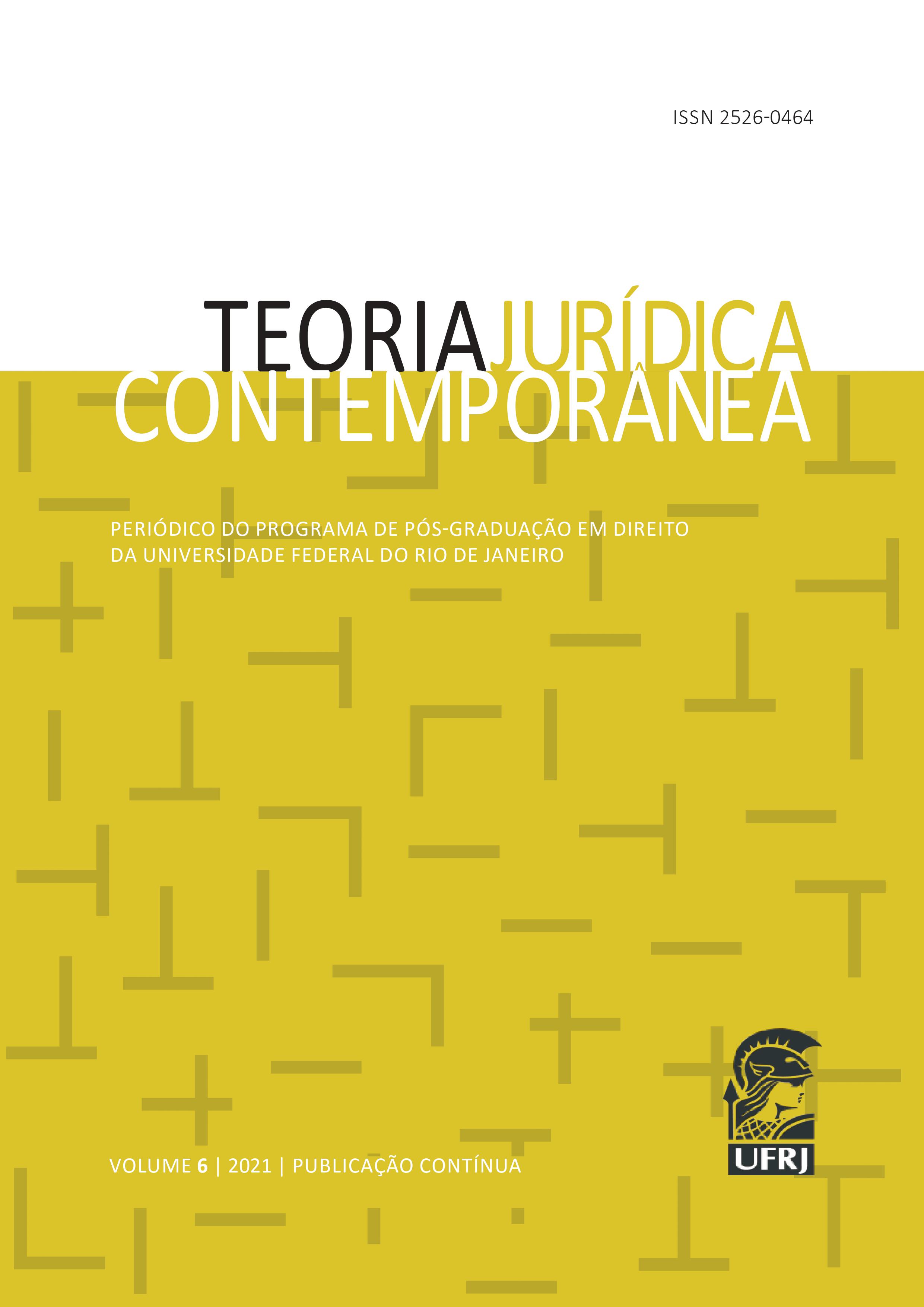REGRAS, PRA QUE TE QUERO? A RELEVÂNCIA DO DIREITO NA REGULAÇÃO DE NOVAS TECNOLOGIAS
DOI:
https://doi.org/10.21875/tjc.v6i0.44759Palavras-chave:
Autorregulação, Formalismo, Tecnorregulação, Meta-tecnologiaResumo
O objetivo do presente artigo é analisar qual destas opções é a melhor em se tratando da regulação de novas tecnologias: se o banimento total, a autorregulação ou a tecnorregulação. A hipótese levantada é que a regulação jurídica é necessária, constituindo a maneira adequada de se regular novas tecnologias de modo que coexistam a possibilidade de desenvolvimento tecnológico e a salvaguarda de direitos fundamentais. Discutimos as contribuições do formalismo jurídico para a regulação das inovações tecnológicas, explorando os conceitos de legal regulation by design e direito como meta-tecnologia. Concluímos que, embora não seja suficiente per se, uma perspectiva meta-tecnológica do direito é fundamental para uma regulação efetiva das novas tecnologias.Downloads
Referências
ALEXANDER, Larry; SHERWIN, Emily. The rule of rules: morality, rules, and the dilemmas of law. Durham: Duke University Press, 2001.
FLORIDI, Luciano. Energy, risks, and metatechnology. Philosophy and Technology, v. 24, n. 2, p. 89-94, 2011.
FLORIDI, Luciano. The fourth revolution: how the infosphere is reshaping human reality. Oxford University Press, 2014.
FRAZÃO, Ana. Fundamentos da proteção de dados pessoais. Noções introdutórias para a compreensão da importância da Lei Geral de Proteção de Dados. In: TEPEDINO, Gustavo; FRAZÃO, Ana; OLIVA, Milena D. (coord.). Lei Geral de Proteção de Dados Pessoais e suas repercussões no Direito Brasileiro. 1.ed. São Paulo: Thomson Reuters Brasil, 2019. p. 23-52.
FREY, C. B. The technology trap: capital, labor, and power in the age of automation. Princeton, New Jersey: Princeton University Press, 2019.
HILDEBRANDT, Mireille. Legal Protection by Design: Objections and Refutations. Legisprudence, v. 5, n. 2, p. 223–248, out. 2011.
HILDEBRANDT, Mireille. Smart technologies and the end(s) of law: novel entanglements of law and technology. Cheltenham, UK: Edward Elgar Publishing, 2015.
HILDEBRANDT, Mireille; TIELEMANS, Laura. Data protection by design and technology neutral law. Computer Law & Security Review, v. 29, n. 5, p. 509–521, 2013.
HILDEBRANDT, Mireille; VRIES, Katja de (Orgs.). Privacy, due process and the computational turn: the philosophy of law meets the philosophy of technology.
Abingdon, Oxon, [England] ; New York: Routledge, 2013.
LEENES, Ronald. Framing Techno-Regulation: An Exploration of State and Non-State Regulation by Technology. Legisprudence, v. 5, n. 2, p. 143–169, 2011.
LESSIG, Lawrence. Code: and other laws of cyberspace. New York: Basic Books, 1999.
LESSIG, Lawrence. Code is Law: on liberty in cyberspace. Harvard Magazine, 2000. Disponível em: http://harvardmagazine.com/2000/01/code-is-law-html. Acesso em: 15 jan. 2020.
LESSIG, Lawrence. Free culture: The nature and future of creativity. New York:
Penguin, 2004.
LESSIG, Lawrence. Code: version 2.0. New York: Basic Books, 2006.
O’NEIL, Cathy. Weapons of math destruction: how big data increases inequality and threatens democracy. First edition ed. New York: Crown, 2016.
PAGALLO, Ugo. The laws of robots: crimes, contracts, and torts. Dordrecht, Heidelberg, New York, London: Springer, 2013.
PAGALLO, Ugo et al. New technologies and law: global insights on the legal impacts of
technology, law as meta-technology and techno regulation. 2015. Disponível em:
https://www.lawschoolsgloballeague.com/wp-content/uploads/2017/01/New-Technologies-
and-Law-Research-Group-Paper-2015.pdf. Acesso em: 21 jun. 2021.
PAGALLO, Ugo. The legal challenges of Big Data: putting secondary rules first in the field of EU Data Protection. European Data Protection Law Review, v. 3, n. 1, p. 36-46, 2017.
PAGALLO, Ugo; DURANTE, Massimo. The philosophy of law in an information society. In: FLORIDI, Luciano (ed.). The Routledge handbook of philosophy of information. London, New York: Routledge, 2016, p. 396-407.
PASQUALE, Frank. The Black box society: the secret algorithms that control money and information. Cambridge: Harvard University Press, 2015.
SCHAUER, Frederick. Formalism. Yale Law Journal, v. 97, n. 4, 1988. Disponível em: https://digitalcommons.law.yale.edu/ylj/vol97/iss4/1. Acesso em: 13 jan. 2021.
SCHAUER, Frederick. Imposing Rules. San Diego Law Review, v. 42, n. 1, p. 85, 2005.
SCHAUER, Frederick F. Playing by the rules: a philosophical examination of rule-based decision-making in law and in life. Repr. Oxford: Clarendon Press, 2002. (Clarendon law series).
SCHAUER, Frederick F. The force of law. Cambridge, Mass.: Harvard Univ. Press, 2015.
STRUCHINER, Noel. Formalismo Jurídico. In: Vicente de Paulo Barretto. (Org.). Dicionário de Filosofia do Direito. Rio de Janeiro: Renovar/ Unisinos, 2006, p. 363-366.
STRUCHINER, Noel. O “aparente” paradoxo das regras. ethic@ - An international Journal for Moral Philosophy, v. 8, n. 3, p. 63–71, 2009.
WARREN, Samuel D.; BRANDEIS, Louis D. The Right to Privacy. Harvard Law Review, v. 4, n. 5, p. 193–220, 1890.
ZUBOFF, Shoshana. The age of surveillance capitalism: the fight for a human future at the new frontier of power. First edition ed. New York: PublicAffairs, 2019.
Downloads
Publicado
Edição
Seção
Licença
Os autores que publicam nesta revista concordam com os seguintes termos:
- Os autores mantêm os direitos autorais e concedem à revista o direito de primeira publicação, com o trabalho simultaneamente licenciado sob a Licença Creative Commons Attribution que permite o compartilhamento do trabalho com reconhecimento da autoria e publicação inicial nesta revista.
- Os autores têm autorização para assumir contratos adicionais separadamente, para distribuição não-exclusiva da versão do trabalho publicada nesta revista (ex.: publicar em repositório institucional ou como capítulo de livro), com reconhecimento de autoria e publicação inicial nesta revista.
- Os autores têm permissão e são estimulados a publicar e distribuir seu trabalho online (ex.: em repositórios institucionais ou na sua página pessoal) a qualquer ponto antes ou durante o processo editorial, já que isso pode gerar alterações produtivas, bem como aumentar o impacto e a citação do trabalho publicado (Veja O Efeito do Acesso Livre).
Este obra está licenciado com uma Licença Creative Commons Atribuição-CompartilhaIgual 3.0 Brasil.


